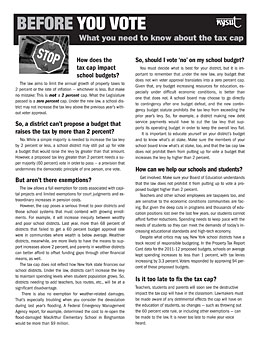You're really busy. We get that. That's why we've created simple things you can do right now to:
-
Call on state lawmakers to fund pre-K-12 and higher education fully and fairly;
-
Fight back against the governor's proposal for a Tier 6 pension; and
-
Become aware of how the tax cap will affect your school's budget.
The month of March is a critical time. Lawmakers need to agree on a state budget before the April 1 deadline. School boards are contending with a devastating tax cap as they prepare their budgets. To top it all off, Governor Cuomo wants to add yet another pension tier that erodes retirement security.
Now it's your turn. Use any one of our tools or tips to let lawmakers know how you feel. Pick the one that works best for you. Send a fax. Sign a petition. Tell friends about what bad budget decisions will do. Anything and everything you do will help.
Stay on the alert
You have many options to get your message out through mac.nysut.org, our new Member Action Center:
Become an e-activist. Simply provide your email address so the site can alert you when your help is needed.
Share the union's message. Shortcuts help you spread the message easily through Twitter, Facebook, YouTube, Google+ and LinkedIn.
Talk about what budget cuts mean at your school, college, health care facility or worksite.
"Like" the Member Action Center's Facebook page.
Register to vote, and help others to register. There's an easy link right on the site.
Email your lawmaker. If you're not sure who represents you, there's a quick link to find out. Share lawmakers' email addresses with your friends.
Contact Albany
The Member Action Center — mac.nysut.org — has easy ways to contact your lawmaker. By sending a fax, you can:
Support more funding for SUNY, CUNY and our community colleges which have endured $1.7 billion in state funding cuts since 2008.
Support more funding for all schools, pre-K-12, not competitive grants that direct funds to a few.
Support funding for teacher centers by restoring $20 million in state aid.
Support more funding for SUNY teaching hospitals and to keep Downstate Medical Center open.
Support retirement security. Oppose Tier 6.
Support increasing the minimum wage to $8.50 an hour to help low-wage workers and reduce the income gap.
Letters are added to the site each week.
Sign the petition
 This year's proposed state budget would restore $805 million for K-12 education. But $250 million of that is set aside for competitive grants, which benefit only a few select districts.
This year's proposed state budget would restore $805 million for K-12 education. But $250 million of that is set aside for competitive grants, which benefit only a few select districts.
Go to http://www.nysut.org/, or take a photo of the QR code at left with your smartphone, and sign the petition. Add your signature telling lawmakers that all public schools need support.
Watch the video on mac.nysut.org about the impact of last year's budget cuts on schools across the state.
Share the video with your friends by posting it on your own Facebook page, tweeting it, or sharing the link by email. Make the point that education cuts don't heal.
Start gathering info about what your class, school or district could do with some extra funds. Give that info to your local union or Political Action Coordinator.
Details will help them when they talk with lawmakers in their district offices March 1-2. Perhaps the meeting is at a time when you can make the case yourself.
Call, invite, visit your lawmakers
Lawmakers can change the proposed budget. You must convince them what they need to change and why the change will help your community. Here's how:
Call or write your state Senator and Assembly member. Tell them how much your community needs its teaching hospitals and the health care they provide. Tell them about the programs your students desperately need.
Talk to parents, friends and neighbors. Ask them to help.
Invite a lawmaker to your classroom, your school, your community college, your university. Let them see the work your students do.
Take a cue from the Syracuse Teachers Association, which coordinated efforts with the district for a joint presentation to lawmakers Feb. 3. At right, Suzanne Slack of the Syracuse City schools provided a fiscal overview to lawmakers.
Visit lawmakers in their home offices, or whenever they schedule a local meeting.
If that doesn't fit your schedule, support your local union or Political Action Coordinator in their efforts to schedule appointments with legislators March 1-2 in their home offices by gathering info. Give details about the impact of Executive Budget proposals on your students, pre-K thru post-grad, to those who will lobby on your behalf.
Support the rural and small city schools lobbying effort from 11 a.m. to 3 p.m. on Feb. 29 at the state Capitol.
Say no to Tier 6
If you don't think pension reform could impact you, think again. The risky Tier 6 proposal being pushed by the governor reduces the long-term stability of defined benefit plans.
You can stop this proposal. Besides sending a fax through mac.nysut.org, you can:
Call 877-255-9417. Follow the options to get to the governor, state Senate or state Assembly. Whether you get to talk with your lawmaker or leave a message, make it clear that you do not support Tier 6.
Call 518-474-4044 and thank state Comptroller Tom DiNapoli for opposing Tier 6.
Watch the video about retirement security featuring NYSUT retiree Jim Frenette, pictured above. The video is posted at mac.nysut.org.
Support the New York State AFL-CIO's ad campaign and view their fliers at http://www.nysaflcio.org/. The information can help when you talk to your lawmakers, or when you write them a letter.
Gather information about what a secure pension means to you. Give those details to the point person in your local union who's making appointments to meet lawmakers March 1-2.
Find out which members from your local will lobby for you at NYSUT's Committee of 100 March 20. Ask them if they need help getting out the message.
Work on school budgets starts now
NYSUT wants to make sure union members, and the public, know the importance of the May 15 school budget vote.
NYSUT is working to help locals get their budget vote message out earlier than ever.
Two months before a budget vote might seem a bit early, especially when school districts aren't sure about the level of state aid. This year is different. It marks the first year districts must contend with the property tax cap. (See fact sheet.)
"School boards, with community input, are deciding right now whether they should try to override the tax cap by getting 60 percent of voters to approve," said NYSUT President Dick Iannuzzi.
Districts that can override the tax cap should be better positioned to put forth budgets that not only maintain current programs and services, but would also fund extra-curricular programs, sports, electives, Advance Placement courses, tutoring and after-school programs. However, a "no" vote will mean a zero percent increase in the budget because under the new law a school district cannot increase spending without voter approval.
As districts develop budgets now, NYSUT is updating the communications toolkit available to local leaders and providing training. The union also provides weekly updates through its website at http://www.nysut.org/.
 What the tax cap will do
What the tax cap will do
When voters go to the polls May 15 to determine the fate of their school budgets for 2012-13, it will mark the first time a public vote will be held since passage of the governor's zero percent property tax cap.
The law — which aims to cap the amount of local revenue a school system can raise through property taxes — poses a difficult challenge for school districts statewide, which are already struggling due to $3 billion in aid cuts over the last three years.
At right, on page 9, is a fact sheet that explains what you need to know about the impact a tax cap will have on your school budget. It's designed so you can cut it out and copy it easily.
Or, download a PDF of the page by visiting http://www.nysut.org/.
Show your support for SRPs
Clerical support staff, aides and assistants, custodial and maintenance workers, food service workers, health care workers, bus drivers and mechanics help make schools run smoothly, transport students and keep them healthy and well-fed. They're also among the first positions to go when budgets are cut.
NYSUT's SRP Advisory Committee members are test-piloting the "SRPs Make a Difference" branding and outreach program in time for the May 15 school budget vote. You can help spread this important message now.
Speak up. Whether you work with SRPs or you are one, let people know that an exceptional educational experience is a collaborative effort and SRPs are a vital component. Do this formally at parent conferences and open houses and informally at social gatherings.
Correct misinformation. For example, when someone says, "We don't need support staff in the classroom. It's too expensive." Explain, "We do need our support staff. An increasing number of students have special health, behavioral and learning needs. Teacher aides provide essential additional support and teaching assistants aid instruction as part of a student's Individualized Education Program."